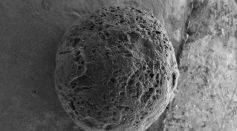PHYSICS & MATH
Caltech Scientists Observe an Optical Chaotic System in Real-Time
Physicists Expose Accidental Discovery of a New Quantum Particle
Researchers Developed a “Swiss Army Knife” Catalyst from 10 Different Elements
Quantum Entanglement of Electrons Achieved Through Heat
Researchers Report Progress on Greener, More Sustainable Hydrogen Extraction from Water
A Day Was Shorter Than 24 Hours in 2020 Because of Earth Spinning Faster
17-year Old Maryam Tsegaye Explains Quantum Tunneling
New Study Might Explain Crystalline Ice’s Anomalous Behavior

Researchers Devise A Novel Method of Producing Carbon Spheres
CERN Discovery Offers Insight About the Antimatter - Matter Discrepancy
Japanese Researchers Use Ruthenium as Cost-Effective Ammonia Catalyst
Scientists, Philosopher Come Up With New Means of Categorizing Minerals
Tunable Heisenberg Model Based on “Ultracold Atoms” Observes New Quantum Behavior
Meet the Ten People Who Played Important Roles In Science In 2020
Most Popular

Largest Known Volcanic Aquifer Discovered Beneath Oregon's Cascades

New 'Supergiant' Sea Bug Found in South China Sea, Named After Darth Vader

Mediterranean Sea Was Refilled by a Catastrophic Flood Millions of Years Ago

Mysterious Cosmic Waves That Sound Like Birds Detected in Unexpected Space Region




